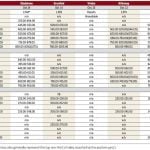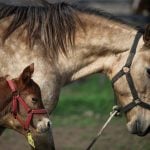Western Canadian feeder cattle prices were steady to $2 per hundredweight lower last week. Weakness in the deferred live cattle futures, along with stronger barley prices, set a negative tone.
Larger volume of 800-pound-plus cattle are coming on the market and with cattle-on-feed numbers above last year, demand for replacement cattle is not as strong.
A presort sale in central Alberta saw Simmental-Charolais-cross steers averaging 565 lbs. selling for $177/cwt. Black Angus age-verified steers weighing 670 lbs. were $166/cwt landed in southern Alberta feedlot. A mixed group of black Angus steers averaging 865 lbs. sold for $135 in southern Alberta. Prices on feature quality cattle remain firm but the overall sentiment is somewhat sluggish.
Read Also

U.S. livestock: Cattle fall sharply as Trump says he’s working to lower beef costs
Chicago cattle futures fell sharply on Friday after U.S. President Donald Trump said his administration was working to lower the…
U.S. second-quarter beef production has potential to be larger than earlier anticipated. Cattle on feed numbers were three per cent higher than year-ago levels as of March 1 and carcass weights are sharply higher. This will weigh on live cattle prices and spill over into the feeder complex.
During April 2011, fed and feeder cattle prices experienced a sharp downward correction and the current environment is conducive for a similar price pattern. U.S. feeder cattle traded $2/cwt lower last week and in some regions were down as much as $5/cwt.
Western Canadian feedlot operators need a fed cattle price of $121/cwt to break even during June and July. Last week, fed cattle traded at $116/cwt as the weaker Canadian dollar supported nearby cash values.
Barley reached up to $232 per tonne delivered southern Alberta, up $2/cwt from a week ago. Feedgrain prices could edge even higher given the historically tight barley carryout.















